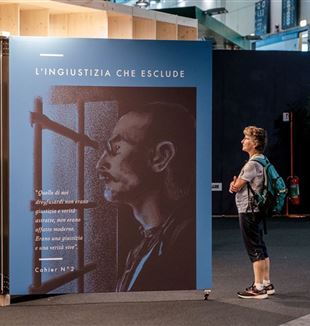
My meeting with Charles and Dorothy
A young university graduate recounts her two days in Rimini. Here is what struck and enthused her about what she saw.This year I only went to the Meeting on the last two days, just in time to hear President of the Republic Mattarella's speech, drink some spritz by the pool and see some exhibitions and meetings. For me, every year the Meeting is a precious appointment in which a desire and a hope can be rekindled.
I am not using the word hope randomly, because it takes me back to one of the moments during those days that most brought me face to face with something that I immediately felt to be great and true for me: the exhibition "The Great Restlessness. Charles Péguy and the harmonious city." "Hope defeats habit. Little hope is the one that always begins again. Hope is charged with beginning again, as habit is charged with finishing beings. Through hope everything remains ready to begin again'. This is the quotation that closed the exhibition and which, in a perhaps unprecedented way, recounts the French writer's courageous and radical political discourse. In fact, his writings were explored in the exhibition, beginning from his socialist period, during which he advocated the release of Alfred Dreyfuss, dedicated himself to charity work (such as a soup kitchen and presidency of a St. Vincent Conference) and founded the periodical Cahiers de la Quinzaine. The exhibition, however, did not stop there; his thoughts on society, justice, work and the secularisation of modern culture were presented, also showing how that inner fire in the face of injustice was further kindled after his return to the Catholic faith.
The existential parable of the French writer and his conception of an active and transformative hope, reminded me of the story of Dorothy Day, an American writer little known in Italy whose cause for beatification is underway. By chance, reading an article in La Lettura, a weekly insert of the Corriere Dell Sera, I went to listen to the meeting on her with Simona Beretta, director of the Centro di Ateneo per la Dottrina Sociale della Chiesa, Robert Elisberg, editor of Day's autobiography and Giulia Galeotti, author of "We are a revolution." The Life of Dorothy Day. I was struck deeply by the life of the American writer, so dense with changes and revolutions, animated by a tense questioning and ready to start again, to 'always begin again'. A militant for the vote for women and a writer with radical and anarchist ideas, she converted to Catholicism in 1927. In the following years, she prayed intensely for the path to be shown to her in which she could fully express her faith and her revolutionary desire, often seeing the Catholic Church as an outpost of the bourgeoisie (a criticism also made by Péguy).
She found her vocation in creating the Catholic Worker Movement newspaper and foundation in New York in 1933, through which she led social battles for a reduction of inequalities and the recognition of workers' rights; she created hundreds of houses of hospitality and fought for the cause of pacifism, even being arrested several times. As Robert Ellsberg said at the Meeting, "she invented a model of holiness that did not exist before. Thanks to Dorothy, future generations of Christians will no longer have to ask the question she asked, ‘Where are the saints who seek to change the social order?’ Well, she answered this question with her own life".
The portraits of these two writers seemed to me specular, restless and eager for change; complex figures who, starting from a painful and faithful observation of reality, acted without ever taking anything for granted, abandoning and then rediscovering their faith in a more authentic way. Both characterised by a unity full of wounds, but courageous in its demand for a better society. The awareness that they could not undo the evil in the world led them to an even more fervent search, following that charity that Péguy describes as "the burning passion to alleviate the suffering of men". Not of the world generically, but of each person encountered.
Read also - So that vacations don't remain a memory
It seems to me that in these experiences, like the Kayròs exhibition, Portofranco and Piazza dei Mestieri, a call is made - which does not leave me indifferent - to a community dimension, where the disinterested and supportive gaze towards the good of the person and their uniqueness, their particular need, is unequivocally welded to the reconstruction of a social fabric, to the denunciation of injustice, of inequalities. But true revolution can only be personal, it must start from oneself. As Péguy writes: 'It is not men from outside who start a revolution, but from within.'
Francesca, Milan, Italy